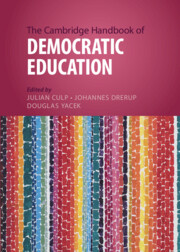Book contents
- The Cambridge Handbook of Democratic Education
- Cambridge Handbooks in Education
- The Cambridge Handbook of Democratic Education
- Copyright page
- Contents
- Contributors
- Acknowledgments
- Introduction
- Part One Historical Perspectives
- Part Two Philosophical and Normative Foundations
- Part Three Key Topics and Concepts
- 16 Educational Justice and Democratic Education
- 17 Global Justice and Democratic Education
- 18 Debate and Deliberation in Democratic Education
- 19 Agonistic Democracy and the Question of Education
- 20 Punishment and Democratic Education
- 21 Children’s Rights and Democratic Education
- 22 Education, Trust, and the Conversation of Democracy
- 23 Patriotism and Democratic Education
- 24 The Voice of Poetry in Cultivating Cosmopolitan and Democratic Imagination
- 25 Disability and Democratic Education
- Part Four Challenges
- Index
- References
18 - Debate and Deliberation in Democratic Education
from Part Three - Key Topics and Concepts
Published online by Cambridge University Press: 20 April 2023
- The Cambridge Handbook of Democratic Education
- Cambridge Handbooks in Education
- The Cambridge Handbook of Democratic Education
- Copyright page
- Contents
- Contributors
- Acknowledgments
- Introduction
- Part One Historical Perspectives
- Part Two Philosophical and Normative Foundations
- Part Three Key Topics and Concepts
- 16 Educational Justice and Democratic Education
- 17 Global Justice and Democratic Education
- 18 Debate and Deliberation in Democratic Education
- 19 Agonistic Democracy and the Question of Education
- 20 Punishment and Democratic Education
- 21 Children’s Rights and Democratic Education
- 22 Education, Trust, and the Conversation of Democracy
- 23 Patriotism and Democratic Education
- 24 The Voice of Poetry in Cultivating Cosmopolitan and Democratic Imagination
- 25 Disability and Democratic Education
- Part Four Challenges
- Index
- References
Summary
Debate and deliberation are two commonly promoted strategies for democratic education. Both strategies are designed to unearth different points of view and then engage in reason-giving and argumentation; in other words, they help students to recognize pluralism. When done well, both also model inquiry and deepen understanding about the issues being investigated. In this chapter, we discuss the theoretical justification for each and show how the adversarial aspect of debate engages a different set of democratic skills than the more collaborative approach of deliberation. These differences require teachers to make judgments about how best to use these strategies in the classroom. We conclude by addressing some critiques of these strategies and discuss how alternative discussion designs might overcome some of the limitations of deliberation and debate.
- Type
- Chapter
- Information
- The Cambridge Handbook of Democratic Education , pp. 298 - 310Publisher: Cambridge University PressPrint publication year: 2023

